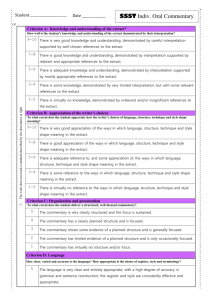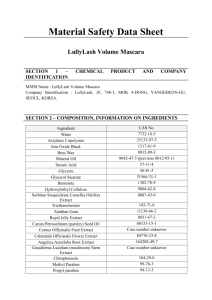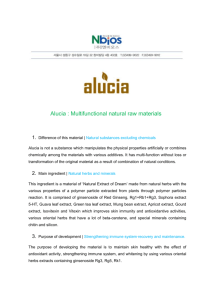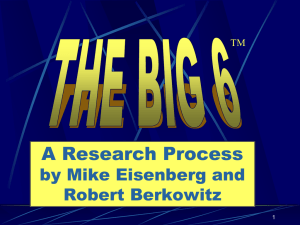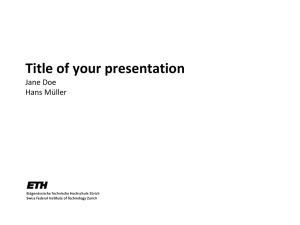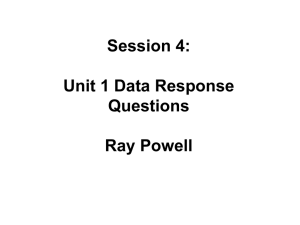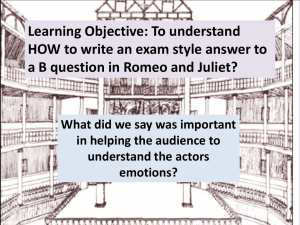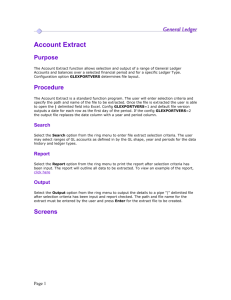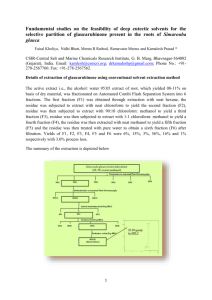Music
advertisement
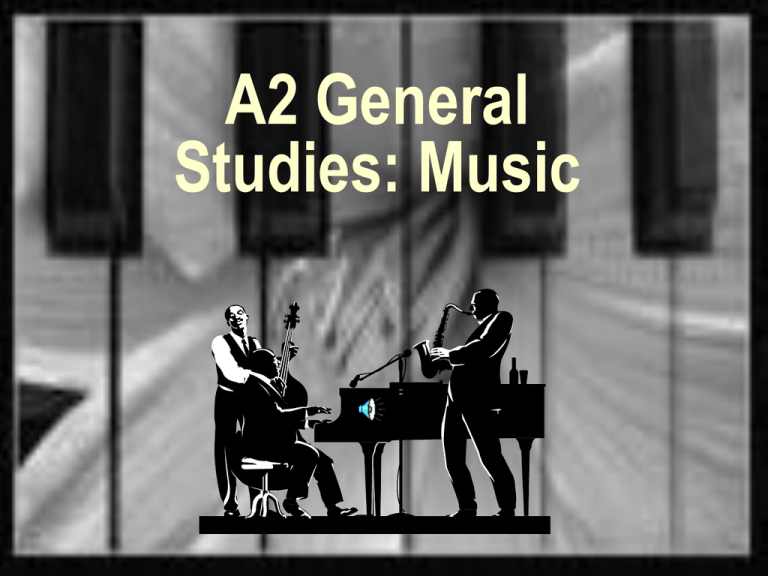
A2 General Studies: Music Music Is All Around Us To people in many cultures, music is completely intertwined into their way of life. In small groups, list all the places and situations that you can think of, where you are exposed to music of some kind. You have till the end of the 67 second ‘meditative’ clip to list your answers! From the moment we are born we experience music everywhere – it is all around us – and in fact there is even a market for introducing music to us before we are born! Baby Music So –we should all have quite a lot to say about a subject that affects us all so much in our lives! Good for a possible General Studies question….. so let’s now have a more detailed look at the various functions of music in our lives. Music Affects Mood Music can create a strong emotional response – and this is exploited in films / shops / advertising / gyms / shops etc. It is also often the main reason we all listen to a particular style at a particular time – we like how it enhances our mood! Listen to the music on the Youtube clips below and decide which ones create the following emotional responses: CALM / POWER THEN SUSPENSE / ENERGY / MOTIVATIONAL / DRAMA AND ANTICIPATION Try to work out why they make you feel a certain way – fast / slow speed (tempo) or rhythms? High / low pitch? Loud / soft (dynamics)? Instrumental sound (timbre)? Extract 1 Extract 2 Extract 3 Extract 4 Extract 5 Music has strong associations with MEMORY Music is very powerful in triggering memories – we often remember significant times, places and people from our pasts when we hear certain songs or musical pieces. This is especially true of the music you listen to during and after puberty – as a teenager, and this is also why compilations of music from the fifites / sixties / seventies / eighties etc. sell so well! Can you think of any songs you associate with people or events in your life? What period of your life might you associate with this song? What memories are often evoked by older people hearing this clip? Music is an important part of many of our cultural RITUALS Listen to the following extracts and identify which ritual / event we associate them with: Extract 1 Extract 4 Extract 2 Extract 3 Music can help us to IDENTIFY things Products (used in advertising music and jingles) Characters (used in films) Place or location (used in films) Time or era (used in films and TV) TV programmes (through title and end credits) Events (Such as European or World Football, or Comic Relief) This is achieved through exploiting musical stereotypes we have all grown up with, and which have become part of our musical history, and also through repeatedly hearing the music. Discuss the powerful associations we have with the music in the following extracts: Extract 1 Extract 2 Extract 3 Extract 4 Music can help to promote unity within a social group Being a small part of a larger musical sound is a very powerful feeling indeed, and bonds participants together. As everyone can sing (yes you can!) this is the most common medium used – e.g. congregational hymns in religious ceremonies; football chants; audience participation at gigs; community singing / musical singalongs / pub singalongs / group karaoke etc. Look / listen at the following two examples, and see if you can think of any more! National Anthem Last Night of the Proms Sub-Cultures A by-product of this is where music forms a vital part of a sub-culture, (particularly for young people), where the group members listen to a similar style of music / follow a particular dress code etc. This is an important social function of music. Can you think of any subcultures based on musical taste? On the following slide are various pictures of people. On your sheet, see if you can identify what kind of music each person could be into, based purely on their style of dress! Picture A Picture F Picture K Picture B Picture C Picture D Picture G Picture H Picture I Picture L Picture M Picture N Picture E Picture J Music and Influence As music is such a powerful and influential medium, it has been used throughout history by: Politicians trying to influence people through music: Musicians trying to influence through music and lyrics: How far do you think music has the power to influence people – and particularly young people? Discuss the following case: Marilyn Manson Music is also Big Business! Creativity and artistic expression aside, music is often produced first and foremost to MAKE MONEY! Throughout history, composers have had to write music for certain occasions and functions as required by their patrons (employers). Nowadays, composers often make their living through commissions – where someone employs and pays them to write a certain piece of music for a certain effect, e.g. a film score or advert. So – money is the motivation to some degree! Much music is also manufactured specifically to sell in large quantities – what do you think of ‘manufactured pop’ such as that of Stock, Aitkin and Waterman in the 1980s, or programmes such as The X Factor, and Pop Idol? Music and Dancing Moving our bodies to music must be as ancient as the human race itself! We have a natural physical response to music – whether it is simply nodding our heads or tapping our feet; or moving our bodies; or simulating playing instruments (air guitar?!); or full on dancing! In modern society we often conduct our dancing in a fairly controlled way, and we certainly get more inhibitions about doing it publicly as we get older. Children often have no such inhibitions about dancing! Where do people dance in our society now? It is primarily RHYTHM that we respond to with movement. A steady beat is all it takes! Look and listen to the following extract (that you should recognise from earlier!) where dance / movement is taking place. How is the music affecting the movement? Extract 1 Music can used simply as a ‘silence filler’! Write down any examples you can think of, where music is used as a background sound to avoid silence! The pictures below should help to get you started…and you can have some music playing while you are thinking!! Music is also a form of selfexpression and creativity! For people who compose and write music…. For people who play a musical instrument or sing.. And Finally…. Can you come up with an effective ‘dictionary definition’ for what you think music actually is? The Wikipedia definition includes the following: ‘Music is an art form whose medium is sound organised in time. Common elements of music are pitch, rhythm, dynamics and the sonic qualities of timbre and texture. The creation, performance, significance and even the definition of music vary according to culture and social context.’ How important is music in your life?

